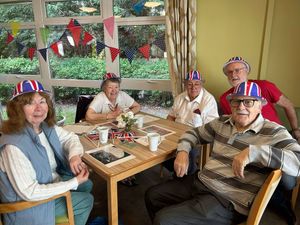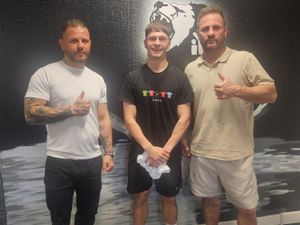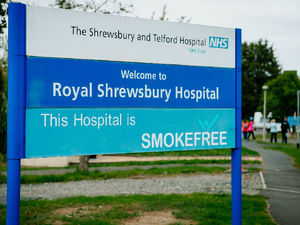Learn from me: Recognise the signs of ovarian cancer
I never thought in a million years I’d fall ill like this – but inspirational stories of other fighters are giving me strength and hope to carry on.

In 40 years as a journalist I’ve had the privilege of interviewing many people going through cancer treatment. Most, hopefully, are still with us. Some, I know, didn’t make it.
Without exception, I was moved by their stories. Each one was different, individual to that person, and it got me every time. Never in a million years did I think I would be one of them.
Not me, who’d barely had a day off ill in my entire working life. I’ve rarely even caught a cold.
Not me, who swam 30 lengths before work twice a week and whose idea of a week’s relaxation was climbing Cumbria’s highest mountains.
Not me, who ate not five but 10-a-day, swore by a healthy dose of porridge for breakfast and devoured more spinach than Popeye.
Now, I love a Guinness and, as my colleagues have witnessed, I’ll elbow the opposition out of the park when it comes to office cake. And I can be as lazy as the next person. But unhealthy? No. Getting cancer? Never.
Ovarian Cancer Awareness Month
However, I have ovarian cancer, stage 3b “at least”, as my consultant thoughtfully added in a letter to me. It’s a bit like saying “I’m an alcoholic” because, even in recovery, it’s something that will never go away.
While survival rates for breast cancer have shot up in recent years thanks to a focus on early warning signs, ovarian cancer is dubbed ‘the silent killer’ because there are no symptoms.
It’s why 80 per cent of women diagnosed with the disease, like me, are already at an advanced stage.
Find out more:
I put pen to paper because this is Ovarian Cancer Awareness Month and if there’s something I can do to open people’s eyes to the possibility they may have it, or get it in the future, it’s sharing my own story.
What experts are now stressing is that there are warning signs for ovarian cancer. The problem is they are not clear - they can look like symptoms of other, more trivial, conditions.
BEAT - know the signs
B is for bloating that doesn’t come and go
E is for eating difficulty and feeling full more quickly
A is for abdominal and pelvic pain you feel most days
T is for toilet changes in urination and bowel habits
In my case, a GP appointment before work on Christmas Eve 2018 revealed I had a water infection. Unusual, I said, I’ve never had one before. My doctor told me it was due to my age and prescribed antibiotics.
What I didn’t know then was that a tumour was already growing inside me and the infection was a symptom of it.
The infection cleared up but the urgency of wanting to go to the toilet, one of the side effects, continued. There were times I practically sprinted past the sports desk to make the Ladies in time. It was the tumour growing, pressing on my bladder.
In May, very randomly, I got a bad ear infection. My GP again gave me antibiotics but the condition worsened and five days later the right side of my face had dropped. I was admitted to the Queen Elizabeth Hospital in Birmingham with a possible stroke.
It turned out to be Ramsay Hunt Syndrome, caused by the chickenpox virus which lies dormant in your body from childhood, and which can be reactivated when your immune system is low.
Doctors told me later the tumour was feeding on the protein in my body, leaving me with little resistance to infections.
'Chronically tired'
I made a complete recovery but in June returned to my GP - by now I’d seen her more times in six months than I’d seen any doctor in the previous six decades. I was concerned about my urgent trips to the loo, and asked for an internal examination.
She concluded I had a partial prolapse, when the pelvic floor muscles are stretched and sag, more common in women who have had children than me, who hasn’t. I said as much to her, that it didn’t seem right.
But she insisted: “It’s your age.” It wasn’t. It was the tumour getting bigger.
Around this time I started to record in my diary feeling “chronically tired”, “exhausted”, “weary”. I dreaded being sent out on jobs at work.
After a while I thought I felt a hardness in my belly when I lay on my back and pressed down with my hands.Then in October, within days of returning from a holiday in Spain, I started post-menopausal bleeding and was immediately referred as an emergency to the Women’s Hospital in Birmingham.
Early on, doctors spoke of it as a cyst, which sounded friendly enough. I am, if nothing else, ever the optimist.
But fears began to creep in. The cyst was now being referred to as a tumour and had grown so big that I looked like I was carrying a full-term baby. Not a good look for a 64-year-old.
Six-hour surgery
I was transferred to the specialist Oncology Treatment Centre at City Hospital and it was here I learned I had a raised risk of the tumour being cancerous.
My six-hour surgery took place on December 14. It was the biggest tumour, 23cm by 22cm, that my consultant had ever removed, which made me strangely proud. He confirmed it had been cancerous and had contaminated other organs but that these, too, had been removed.
However, in January came the news that the cancer had spread to my diaphragm and lower intestines and I would need chemotherapy.
I’m now midway through the treatment and doing okay. The main side effects for me are tiredness, and the loss of about 50 per cent of my hair. I wear an ice cap during chemo to help reduce this but have now bought a wig, which I’ve yet to wear, as my hair continues to fall out.
The other side-effect is emotional. The shock of reading on Google one sleepless night that my survival chances were not good sent me into a downward spiral. I literally couldn’t speak the next day.
I now get my information from other women going through the same god-awful experience. They are my tribe and they keep me sane.
Even so, ovarian cancer carries a very high risk of relapse. The first two years are critical. If you survive that period without a recurrence, then you’re in with a chance.
Random
I’ve talked to a woman who lasted 14 years before her first relapse. I’ll take that, thank you.
Other women have endured further bouts of chemo and more surgery and are still here to tell the tale. They are fierce females, every one.
Ovarian cancer picks on women at absolute random, regardless of whether they are fit and healthy or led a life of fags and takeaways. Nothing I did, or didn’t do, led to this terrifying diagnosis.
My GP, however, should not have dismissed my symptoms so lightly. And if I’d been aware of the signs myself, I would have challenged her more.
A simple blood test to check for a substance called CA125 - produced by some ovarian cancer cells - could have caught the disease earlier.
The charity Ovacome, supporting women with ovarian cancer, which recently opened its first base outside London in Dudley, is promoting the acronym BEAT to alert women to the possible signs.
B is for bloating that doesn’t come and go
E is for eating difficulty and feeling full more quickly
A is for abdominal and pelvic pain you feel most days
T is for toilet changes in urination and bowel habits
I hope to beat this thing because I'm a loving-life kind of gal. I love every small inconsequential bit of it - a well-made cup of tea, an apostrophe in the right place, finding my car keys after a frantic search, a Baggies’ win. I’m not ready to give up on these simple everyday pleasures yet.
Before cancer, I saw myself alive and kicking at 100, the age my mother will be this year, and the age reached by her father before her.
My new goals are shorter-term: to return to work in June, give one of the speeches at my niece’s wedding in September and celebrate the first anniversary of my surgery with a pint or two of Guinness.
And I really hope to pass the critical two-year deadline without a relapse. Anything beyond that is a big fat beautiful bonus.




